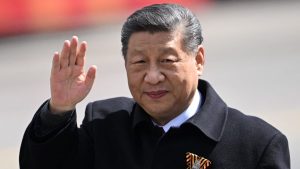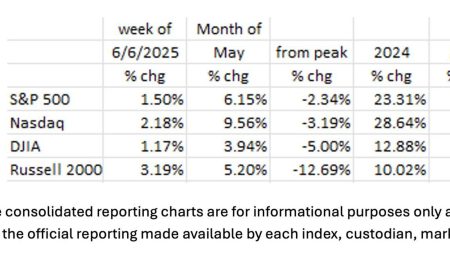China’s 2024 Economic Stimulus and the Path Forward
China’s economy received a significant boost in the latter half of 2024 due to an unprecedented stimulus package implemented by the government. This encompassed a range of measures including broad interest rate cuts, reduced down payment requirements for home purchases, a substantial stock market stabilization fund, a dedicated lending facility for listed corporations to repurchase shares, and extensive financial relief for local governments. These actions fostered positive market returns, reflected in the performance of key indices like the KraneShares MSCI All China Index ETF (KALL), the KraneShares MSCI China A 50 Connect Index ETF (KBA), and the KraneShares CSI China Internet ETF (KWEB). The stimulus marked a shift from China’s previous fiscal conservatism, utilizing a fraction of the country’s borrowing capacity while addressing economic headwinds stemming from declining housing prices and subdued consumer spending.
Despite initial skepticism among global investors, stemming from lingering concerns about previous regulatory interventions and geopolitical tensions, the stimulus package demonstrates the government’s commitment to revitalizing the economy. The government’s relatively low debt-to-GDP ratio compared to other major economies provides ample room for further fiscal maneuvering. The People’s Bank of China is expected to maintain an accommodative monetary policy stance in 2025, including further interest rate cuts and reductions in reserve requirements for banks. However, simply increasing the supply of capital does not guarantee increased borrowing and investment. Policymakers must focus on restoring consumer and business confidence to fully stimulate economic activity, suggesting that the 2024 stimulus was merely the first step in a broader economic revitalization strategy.
China’s current economic landscape presents an attractive investment opportunity, particularly in its equity market. The country’s low risk-free rate, coupled with high dividend yields, creates a favorable equity risk premium compared to other major economies, especially the United States. This combination has historically preceded periods of strong equity market performance in China. Furthermore, a resurgence in margin collateral usage indicates increasing investor confidence and participation in the stock market. The combination of supportive monetary policy and positive market sentiment positions China’s equity market for potential continued growth in 2025.
Beyond broad monetary measures, the Chinese government is implementing targeted fiscal policies aimed at stimulating domestic consumption. While some international observers advocated for widespread direct cash transfers to consumers, China has opted for a more strategic approach. By bolstering local government finances, the central government aims to empower municipalities to improve local business conditions, increase public sector hiring, and support local businesses. These measures indirectly support consumption by improving overall economic stability and employment. Simultaneously, efforts to stabilize and potentially increase housing prices aim to reverse the negative wealth effect from previous real estate market declines, which had dampened consumer spending. Early signs of recovery in real estate transaction volume and housing prices further support the effectiveness of this targeted approach.
The effectiveness of targeted consumption stimulus is evident in the success of trade-in subsidies for automobiles and home appliances. These subsidies, implemented in 2024, have already generated substantial growth in the purchase of these goods, surpassing overall retail sales growth. This model is expected to be extended to other sectors with significant downstream employment impact, such as technology, restaurants, and food services, further bolstering consumer spending and economic activity. The focus on supporting key employment sectors underscores the government’s strategic approach to economic recovery and its focus on sustainable growth.
China’s internet sector is positioned to be a key beneficiary of the government’s stimulus measures and broader economic recovery. As integral components of the Chinese economy, internet companies are likely to experience the positive effects of increased consumption and improved market sentiment. Strong earnings expectations, coupled with increased free cash flow yield, share buybacks, and dividends, make Chinese internet companies particularly attractive to investors. Despite significant performance gains in 2024, these companies remain undervalued compared to their US counterparts, further enhancing their investment appeal. The combination of supportive government policies, strong fundamentals, and attractive valuations suggests significant growth potential for the Chinese internet sector in 2025.
Beyond short-term stimulus, 2025 holds the potential for addressing some of China’s long-standing structural economic challenges. Having navigated periods of regulatory tightening and economic deleveraging in recent years, the Chinese government is now in a position to implement much-needed structural reforms. These reforms could address issues like the high household savings rate, partially driven by individual responsibility for retirement and healthcare costs, and the hukou system, which restricts migrant workers’ access to public services. Healthcare reform, following the 2024 anti-graft campaign, could improve public healthcare services and boost consumer confidence. Similarly, hukou system reform could encourage consumption by reducing the need for migrant workers to maintain high savings for unforeseen expenses. While these structural reforms represent long-term development initiatives, they could have significant positive impacts on consumer confidence, demographics, and long-term economic growth.
The incoming Trump administration presents both potential challenges and opportunities for China’s economy and its relationship with the United States. While Trump’s previous tariff threats have made some investors wary of Chinese equities, his recent actions, including inviting Xi Jinping to his inauguration and opposing outbound investment restrictions, suggest a potential for improved relations. Furthermore, China’s increasing trade with other Asian countries reduces its reliance on the US market, mitigating the potential impact of future tariffs. Trump’s business background and focus on deal-making could lead to a “grand bargain” with China, benefiting both economies. Although negotiations may be tough, a mutually beneficial agreement could remove a significant source of uncertainty and further boost investor confidence in China’s market. This potential for improved US-China relations, coupled with the ongoing domestic economic reforms and stimulus measures, creates a compelling narrative for continued investment in China’s equity market in 2025.










